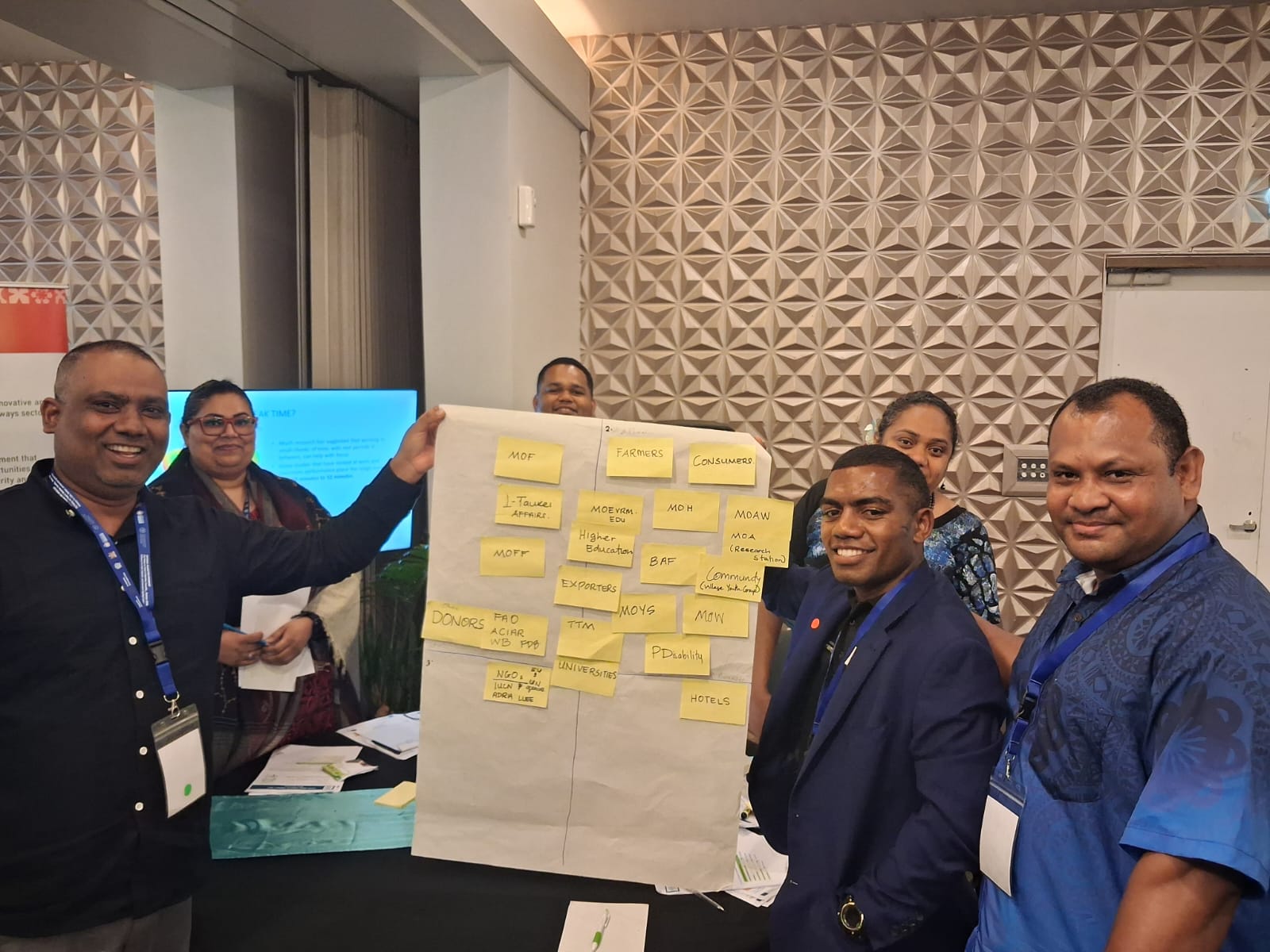Fiji charts a unified vision for 2025: Government hands over food and nutrition security policy and advances convergence across food, climate and nutrition agendas

The Government of Fiji has officially handed over the Fiji Policy on Food and Nutrition Security (FPFNS), marking a key step toward a more coherent and resilient agrifood future.
The handover coincided with a National Validation Workshop on Fiji’s Food and Nutrition Security Policy and Horizon 2030: Pathways to a Safe, Resilient, and Innovative Agrifood System organized by the Government of Fiji, in collaboration with the Food and Agriculture Organization of the United Nations (FAO) and the UN Food Systems Coordination Hub.
Participants reaffirmed Fiji’s leadership in advancing integrated policy design, emphasizing that sustainable food systems are central to climate resilience and public health.
The three-day workshop (14–16 October) brought together over 100 participants from government ministries, UN agencies, development partners, academia, civil society, and the private sector to validate Fiji’s National Food and Nutrition Security Policy (2025–2030) and advance the Convergence Initiative for Food Security and Climate-Smart Agriculture and Fisheries.
Bringing global flagships together for local impact
The event marked the first time in the Pacific that two global Hub flagships – the Convergence Initiative, launched by the UN Deputy Secretary-General at COP28, and the Accelerating Food Systems Transformation through a Scalable Success Model (SSM) project, funded by the European Union – were implemented jointly. Together, they represent a new integrated approach to accelerating food systems transformation through policy coherence, stakeholder convergence, and climate-smart investment.
“Fiji’s leadership exemplifies the convergence of food systems and climate action,” said Dr. Stefanos Fotiou, Director of the UN Food Systems Coordination Hub, in his opening remarks. “This workshop demonstrates what transformation looks like in practice – linking national priorities to global solidarity, translating pathways into action, and ensuring that no community is left behind.”
“The European Union is proud to support this critical consultation on Fiji’s food systems transformation,” said Barbara Plinkert, EU Ambassador to the Pacific. “This is a timely opportunity to address pressing challenges like malnutrition and rising food imports through strategic reforms, including the reallocation of land resources to high-value, nutritious, and climate-resilient crops. By fostering linkages between agriculture and tourism, promoting import substitution, and expanding exports of premium commodities, we can unlock the full potential of Fiji’s agricultural sector to drive economic growth, improve nutrition, and build long-term food security.”
Driving Pacific momentum on food and climate action
The workshop served as a unique platform for the exchange of knowledge, policies, and data, bringing together diverse stakeholders to co-create a collective Vision 2045 for Fiji – a resilient and innovative agrifood system that ensures all Fijians have access to affordable, nutritious, and sustainable food through smart investments.
Hosted by the Ministry of Agriculture and Waterways, in partnership with the Ministry of Health and Medical Services and the Ministry of Environment and Climate Change, discussions in the workshop highlighted key convergence areas between food, climate, and nutrition policies – including integrated governance, food safety and quality, social protection and inclusion, sustainable land management, and innovation for climate-smart and nutrition-sensitive systems. Together, these synergies form the foundation of Fiji’s long-term transformation toward a sustainable and nature-positive food future.
Speaking in front of around 500 participants of the National Celebration – primarily students, young people of the communities and government officials, the Minister of Agriculture and Waterways, Hon. Tomasi Tunabuna reminded the public that “food embodies culture and community, making today not just a celebration but a united call to transform our food system across all sectors.”
Milestones and outcomes
The workshop concluded on World Food Day, coinciding with FAO’s 80th anniversary, where the Government of Fiji officially handed over the finalized Food and Nutrition Security Policy from the Ministry of Agriculture and Waterways to the Ministry of Health and Medical Services – a symbolic gesture of whole-of-government coordination.
Participants also endorsed the Convergence Action Blueprint for Fiji, outlining four implementation pillars:
- Shared Vision and Policy Coherence
- Interventions
- Milestones and Investment Priorities
- Monitoring, Evaluation, and Accountability
These outcomes will inform Fiji’s Cabinet endorsement for both the Nutrition Policy and Horizon 2030, guide national investment priorities, and support future regional dialogues in the lead-up to COP31 in Australia.
Regional leadership, global impact
Fiji now joins seven other pilot countries under the Scalable Success Model – including Cameroon, the Dominican Republic, Kiribati, Madagascar, Mauritania, Sierra Leone, and Zambia – and twelve under the Convergence Initiative. The country’s pioneering approach will serve as a model for Small Island Developing States (SIDS) seeking to align food systems transformation with climate commitments.
“Transformation must be measured not only in commitments made, but in coherent, consistent, and collective action delivered,” said Dr. Fotiou. “Fiji’s vision of a safe, resilient, and innovative food system can inspire the region and the world.”
Next steps
The endorsed policy and Convergence Blueprint will feed into the design of the technical assistance that will be delivered through the SSM project, paving the way for implementation support including seed investment to strengthen national and local implementation structures and catalyze resource mobilization in 2026.
The outcomes will also contribute to the Pacific Food Systems Convergence Dialogue planned for early 2026, consolidating lessons from Fiji, Samoa, and Kiribati as the region advances cooperation for food system transformation and climate resilience.
For more information:
Follow: @FoodSystems | @UN Food Systems Coordination Hub
